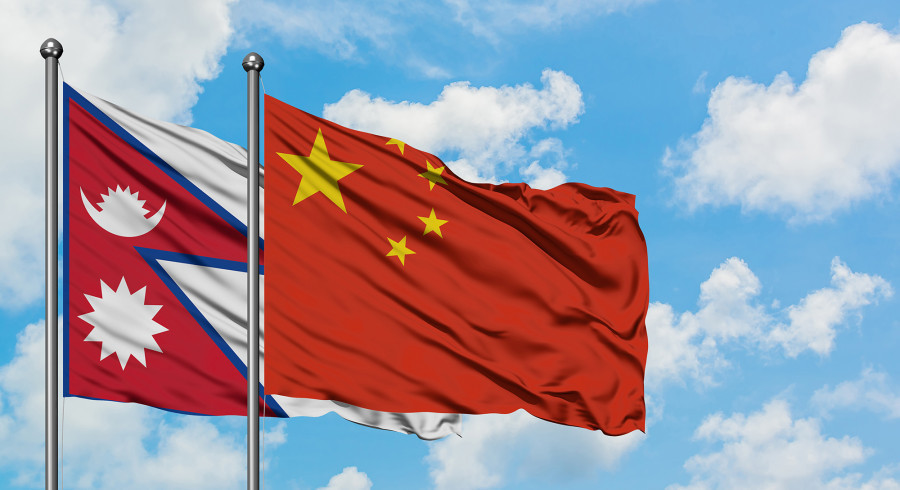National
Nepal, China seal a deal for utilisation of Rs15 billion in Chinese grant
Beijing will reportedly start sending experts for feasibility study of the cross-border railway by the end of this year.
Anil Giri
Nepal and China on Tuesday signed an agreement for the utilisation of Rs15 billion (800 million RMB) in Chinese grants for various projects selected by the Nepali side.
Bishnu Pukar Shrestha, Nepali ambassador to China, and Luo Zhaohui, chairman of the China International Development Cooperation Agency (CIDCA), signed the agreement on the behalf of their respective governments, in Beijing.
CIDCA is China’s external aid and development agency that has already made a foray in Nepal with different developmental activities. The government has already given CIDCA the approval to execute 15 small developmental projects in 13 northern districts, where a portion of the aid has already been received by some local bodies in the districts, according to Nepali government officials.
“A memorandum of understanding for economic and technical cooperation between the government of Nepal and CIDCA was signed in Beijing today,” Shrestha told the Post over phone. “Now it is up to us to select and execute the projects.”
Chinese Foreign Minister Wang Yi, who is also the State Councilor, had pledged Rs15 billion (800 million RMB) to Nepal for the year 2022 for spending in various projects, during the visit of Foreign Minister Narayan Kahdka to China in the second week of August.
“Now the government of Nepal should expedite the project selection for their speedy implementation. The assistance amount was supposed to be spent in 2022, but due to a delay in the agreement’s signing, the assistance will be used in the year 2023-24,” said Shrestha.
The new grant is in addition to the grant announced by the Chinese President Xi Jinping in Nepal in 2019. During official level talks between President Bidya Devi Bhandari and Chinese President Xi in October 2019 in Kathmandu, the latter had announced a Rs58 billion (3.5 billion RMB ) grant to Nepal for two years, but the two sides failed to negotiate as to how to use the money in the wake of the Covid-19 pandemic. Nepal is yet to select projects to be funded under the grant announced by the Chinese president.
“Now, as the next step, we have requested the Chinese side to soon honour President Xi’s 2019 announcement,” Shrestha said. “Nepal too should finalise projects for the second grant’s utilisation.”
Officials at the Nepali Embassy in Beijing, those from the Chinese foreign ministry and other departments of China are holding negotiations on how to utilise the grant announced by President Xi.
“We will hold a meeting over this, on Wednesday,” Shrestha said, adding that the Nepali side is thinking of utilising that grant in some ongoing as well as new projects.
The projects under consideration are the long-delayed second phase of Ring Road expansion, Tokha-Chhahare tunnel, Syabrubesi-Kerung road expansion and construction of a new wing of the Bir Hospital in Bhaktapur.
Also in the plans are the reconstruction of Basantapur Durbar, Nuwakot Durbar, dry port on Nepal-China border (Panchkhal and others), upgrade and maintenance of the Kodari Highway as well as a feasibility study for the Nepal-China cross border railway project.
“The Chinese side has assured that it will start sending experts for the feasibility study of the much-talked about cross-border railway by the end of this year,” said Shrestha.
Similarly, he said the Nepali side is looking to invest the Chinese grants in Nepal-China cross border transmission line project, construction of a bridge in Humla district and in the establishment of a chemical fertiliser factory.
“The quicker we give the Chinese detailed project reports of these projects, the faster we will reach an understanding,” said Shrestha.
He said the Nepali officials “should now proactively work towards finalisation of these projects, so that we can secure the grant at the earliest.”
Nepal is also looking to import 100,000 tonnes of chemical fertiliser (mostly urea) from China, for a period of five years, under the grant.
“The talks have thus far been positive,” said Shrestha.




 20.12°C Kathmandu
20.12°C Kathmandu















